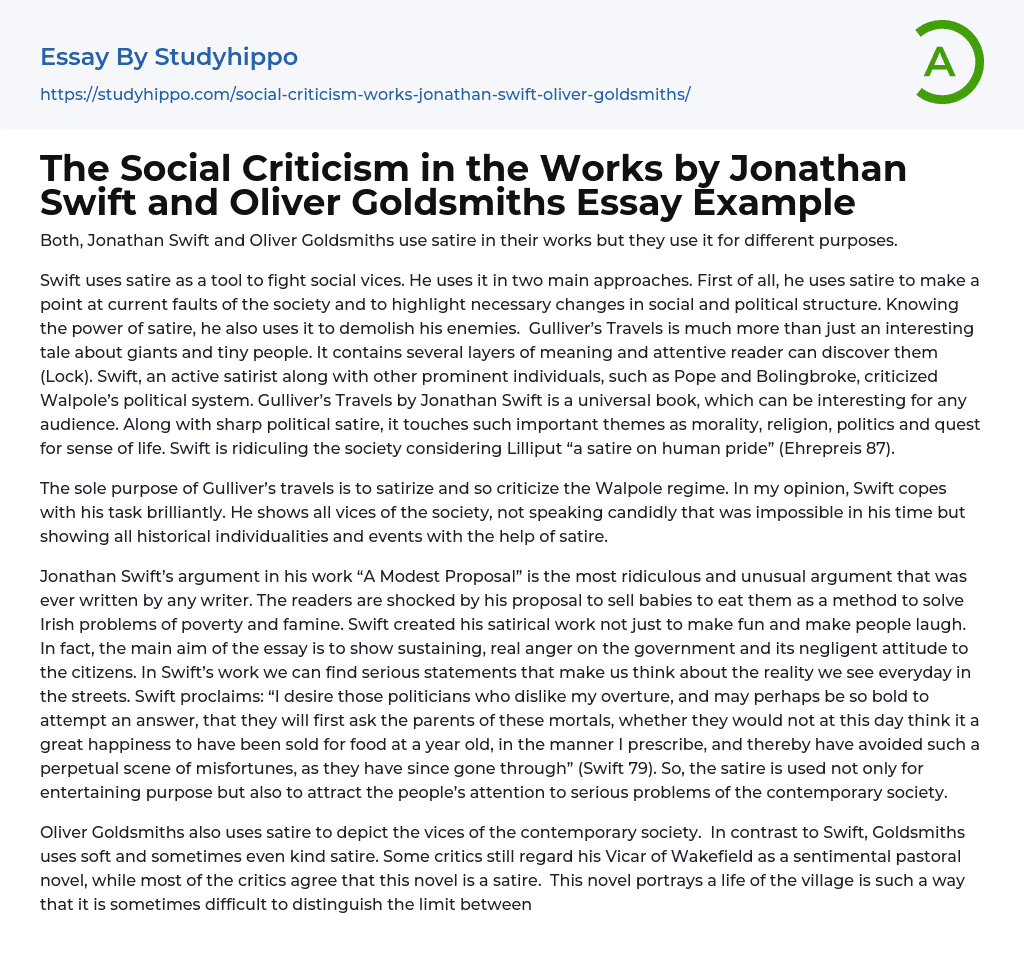

The Social Criticism in the Works by Jonathan Swift and Oliver Goldsmiths Essay Example
Both, Jonathan Swift and Oliver Goldsmiths use satire in their works but they use it for different purposes.
Swift uses satire as a tool to fight social vices. He uses it in two main approaches. First of all, he uses satire to make a point at current faults of the society and to highlight necessary changes in social and political structure. Knowing the power of satire, he also uses it to demolish his enemies. Gulliver’s Travels is much more than just an interesting tale about giants and tiny people. It contains several layers of meaning and attentive reader can discover them (Lock). Swift, an active satirist along with other prominent individuals, such as Pope and Bolingbroke, criticized Walpole’s political system. Gulliver’s Travels by Jonathan Swift is a universal book, which can be interesting for any audience. Along with sharp
...political satire, it touches such important themes as morality, religion, politics and quest for sense of life. Swift is ridiculing the society considering Lilliput “a satire on human pride” (Ehrepreis 87).
The sole purpose of Gulliver’s travels is to satirize and so criticize the Walpole regime. In my opinion, Swift copes with his task brilliantly. He shows all vices of the society, not speaking candidly that was impossible in his time but showing all historical individualities and events with the help of satire.
Jonathan Swift’s argument in his work “A Modest Proposal” is the most ridiculous and unusual argument that was ever written by any writer. The readers are shocked by his proposal to sell babies to eat them as a method to solve Irish problems of poverty and famine. Swift created his satirical work not just to make
fun and make people laugh. In fact, the main aim of the essay is to show sustaining, real anger on the government and its negligent attitude to the citizens. In Swift’s work we can find serious statements that make us think about the reality we see everyday in the streets. Swift proclaims: “I desire those politicians who dislike my overture, and may perhaps be so bold to attempt an answer, that they will first ask the parents of these mortals, whether they would not at this day think it a great happiness to have been sold for food at a year old, in the manner I prescribe, and thereby have avoided such a perpetual scene of misfortunes, as they have since gone through” (Swift 79). So, the satire is used not only for entertaining purpose but also to attract the people’s attention to serious problems of the contemporary society.
Oliver Goldsmiths also uses satire to depict the vices of the contemporary society. In contrast to Swift, Goldsmiths uses soft and sometimes even kind satire. Some critics still regard his Vicar of Wakefield as a sentimental pastoral novel, while most of the critics agree that this novel is a satire. This novel portrays a life of the village is such a way that it is sometimes difficult to distinguish the limit between sentimental description of country life and light irony and social satire. Neither critics nor readers can distinguish whether The Vicar is a sentimental account of pastoral England or social satire targeting this very pastoral England with its values and morals. Even writing in the genre of social satire Goldsmiths seems to feel sympathy to his
characters. His satire is much softer and warmer in comparison to Swift’s satire, which is sharp and accusatory. Goldsmiths uses humor and light satire while addressing complicated social issues, hypocrisy, snobbery, rigid stratification of the society and penal reform.
Despite Goldsmiths and Swift use different kinds of satire in order to reveal social vices, they both find their own ways to the readers’ hears. Popularity of their works shows that themes and problems, eliminated by the authors, did not loose their actuality even nowadays and are still interesting for the modern reader.
- Book Summary essays
- Metaphor essays
- Reader essays
- Rhyme essays
- Literary devices essays
- Villain essays
- Books essays
- Genre essays
- Literary Criticism essays
- Writer essays
- Protagonist essays
- Simile essays
- Poem essays
- Book Report essays
- Book Review essays
- Greek Mythology essays
- Plot essays
- Tragic Hero essays
- Coming of Age essays
- Play essays
- Rhetoric essays
- Rhetorical Question essays
- Translation essays
- Understanding essays
- Reason essays
- Character essays
- Letter essays
- American Literature essays
- Literature Review essays
- Utopia essays
- Poetry Analysis essays
- Dante's Inferno essays
- Between The World and Me essays
- Incidents in The Life of a Slave Girl essays
- Flowers for Algernon essays
- Myth essays
- Everyday Use essays
- Boo Radley essays
- Genesis essays
- Richard iii essays
- Alice in Wonderland essays
- On the road essays
- Ozymandias essays
- The Nightingale essays
- Holden Caulfield essays
- Animal Farm essays
- 1984 essays
- A Hanging essays
- Shooting An Elephant essays
- A Tale Of Two Cities essays



